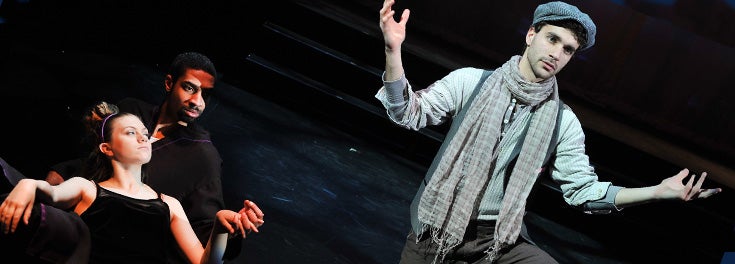Theatre is a team sport, requiring discipline, hard work, high standards of performance—and a love of the game. Just ask anyone involved in bringing a play to life.
“The sports parallel is right,” says Associate Professor Paula McGlasson, chair of the URI Theatre Department. “It takes the whole team to make it work.” Whether you are performing the lead role, building the set, or sewing the costumes, your contribution is essential to the production’s success. This respect for the work that everyone does—on stage and off—defines the department’s approach.
At URI, theatre majors choose a concentration in acting, directing, design and theatre technology, or stage/theatre management. In fact, they can choose two of these disciplines and still complete the Bachelor of Fine Arts degree within four years. The program offers students a conservatory experience, with equal parts theory and practice, based on the belief that a well-trained, well-rounded theatre grad must have basic training and exposure to all areas of theatre.
To say URI theatre students learn by doing is an understatement.
“From the start, you work under Equity rules (for professional theater artists),” says actor and recent theatre grad Andrew Burnap ’13, who will enter the prestigious Yale School of Drama this fall. “Your professional training begins here—whether you’re an actor, director, designer, or stage manager. This underscores the connection of the program to the professional world.
“You have opportunities from the get-go. You have to audition for every play. So you get better at auditioning,” Andrew continues. “The classroom is a lab. Your acting class is a lab. It’s all trial and error. There’s also a code of discipline. It’s about more than talent. You have to work hard. People respect that work.”
This emphasis on professionalism in every aspect of the work is one way that distinguishes the URI theatre program. The result? “We have a very large tool set to work with,” says Andrew. Add to that a variety of internships with esteemed theatre companies, the potential to work as theatre teaching assistants, and the opportunity to work with theatre professionals from the region, and you have not only great learning experiences that enhance your resumé, but relationships that can help you launch your career.
“Our core faculty is augmented by visiting professional artists in all disciplines, so our students have relationships with theatre professionals. They make so many contacts—and they learn from everyone,” says Professor McGlasson.
“We present the opportunities and the students have to go for them. This is a competitive business,” she adds, noting that although many theatre majors have their sights on a career in the theatre, the education they receive is valuable in many other professional arenas. “Our students learn to think on their feet, how to approach things creatively—and the value of teamwork. They are articulate. They have to be. This is an incredible training ground for so many other fields.”
All of the hard work, dedication to craft, and superb preparation certainly pays off. Each year, for example, the theatre program participates in the Kennedy Center American College Theatre Festival with great results, with URI students winning the Irene Ryan Acting Competition, the Stage Management competition, and the Scenic Design competition, all advancing to the Nationals in Washington, D.C.
In theatre—as in any team situation—relationships are important. There’s an obvious family spirit alive and well in the Fine Arts Center, where you’ll find students rehearsing scenes in the hallway, or practicing tap dancing on the stage, as Andrew Burnap did for hours in preparation for his role in “Singing in the Rain,” the final one of his URI career. And although the program is small, it is mighty, and loaded with energy, passion, and the magic that comes from people working together doing what they love.
“This place is about the students,” says Professor McGlasson. “This is a vibrant, exciting place for them to learn.”

